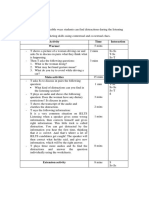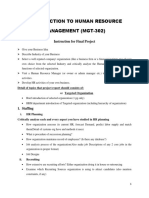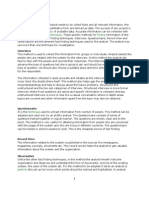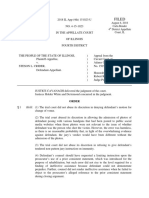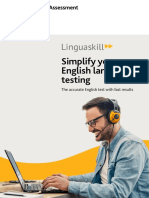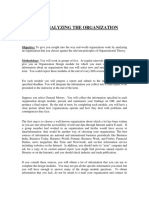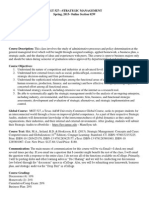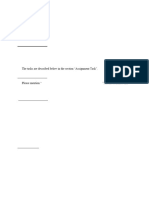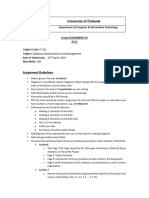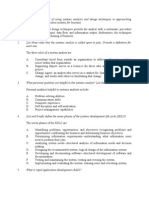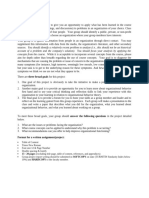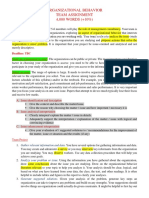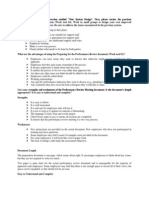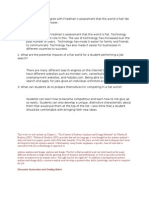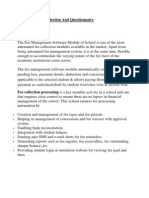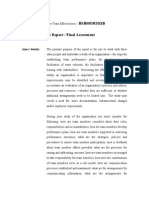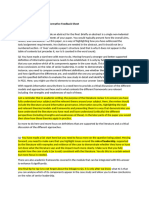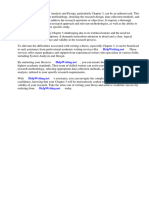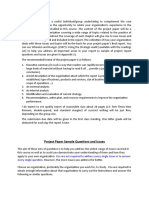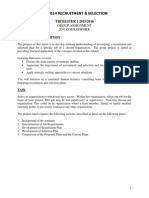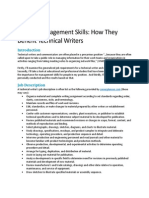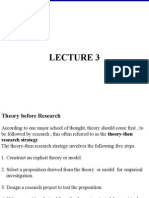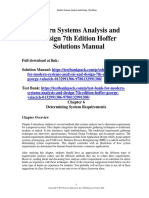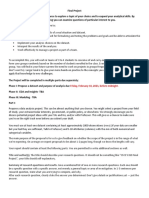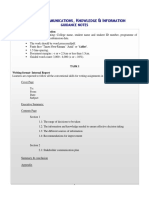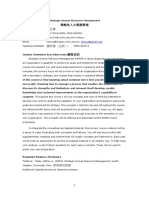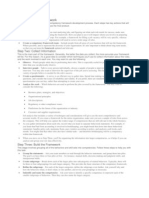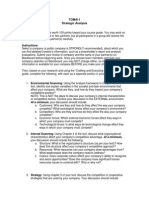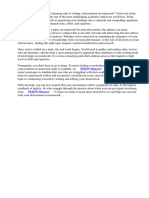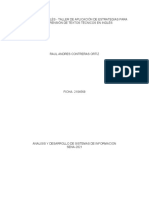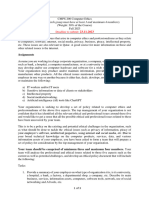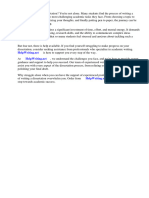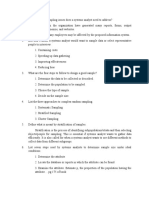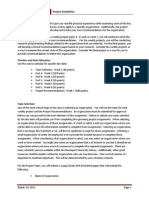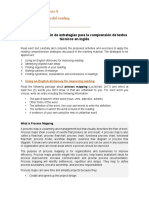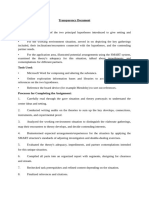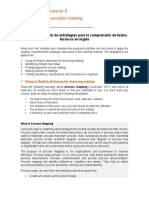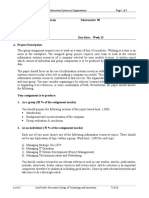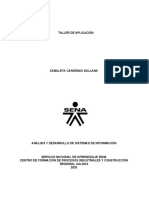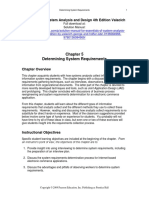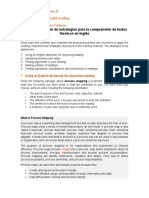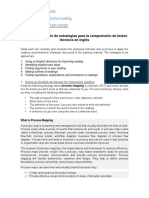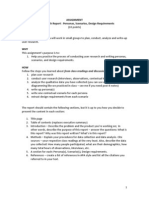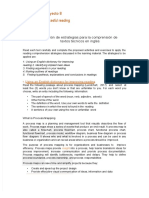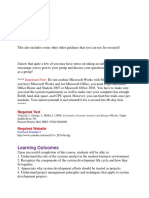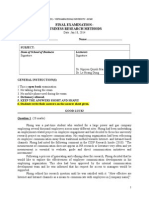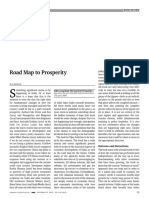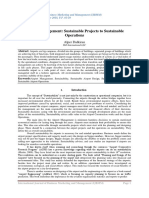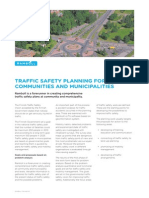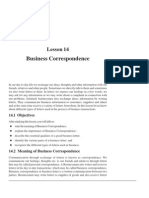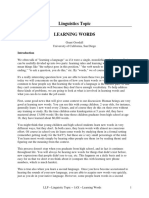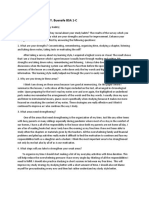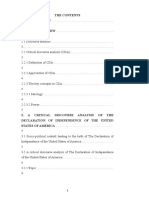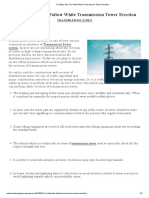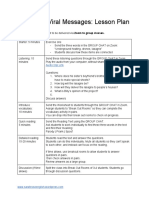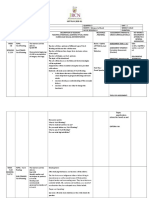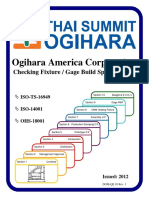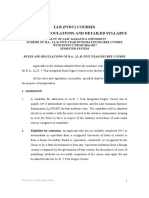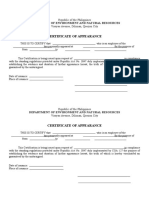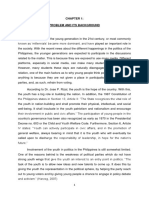Project Guidelines-MIS 422
Project Guidelines-MIS 422
Uploaded by
Faiyazur RahmanCopyright:
Available Formats
Project Guidelines-MIS 422
Project Guidelines-MIS 422
Uploaded by
Faiyazur RahmanOriginal Description:
Original Title
Copyright
Available Formats
Share this document
Did you find this document useful?
Is this content inappropriate?
Copyright:
Available Formats
Project Guidelines-MIS 422
Project Guidelines-MIS 422
Uploaded by
Faiyazur RahmanCopyright:
Available Formats
MIS 422: Management Information System
Term Project Guidelines
PROJECT DESCRIPTION
In this project, you will investigate and evaluate an information system (or systems) within an
organization. You will apply the material and thought processes learned in class to the assessment of a
real-world MIS. As part of a four- or five-person team, you will also practice teamwork and allocation of
work within project planning.
Each team will select an organization, obtain its co-operation, interview one or more employees within
the organization to learn about its MIS, and write a paper describing its investigation and assessment.
Each team member will complete a peer evaluation of the others.
Each paper will differ depending on the organization and MIS investigated, but all must include:
1. A description of the organization and the products and/or services it provides.
2. A description of the system functions and a categorization of the system(s) analyzed.
3. The impacts of the MIS on the organization.
4. A criticism of this system.
Other information that may be included, as pertinent to the company, the system(s), and your interests, is:
5. A description of the hardware, software, and telecommunications system.
6. A description of how the system was built or acquired.
7. A discussion of how the system is used to gain competitive advantage.
8. A description of its use.
9. A comparison to other systems discussed in class and/or studied in the text and readings.
When narrowing the topic for your paper, consider the person(s) to be interviewed. Interviewees who are
end-users of systems are likely to know more about topics 7 and 8 than about 5 and 6. The reverse is
probably true for interviewees who work in Information Systems departments.
PROJECT STEPS
1. Select a team containing four or five members.
2. Select an organization and make contact. You may find it necessary to make contact with more
than one person in an organization, or even more than one organization, to elicit a promise of co-
operation and participation. If needed, I'll write a letter to a prospective contact person
promising confidentiality. If you select an organization that employs one or more team members,
you must interview someone besides the team member(s).
3. Write a project plan. This plan will include a roster of the team, the organization and contact
person(s), the scheduled interview date(s), and a short description of what you will be
investigating at the organization. This plan will be typewritten and no more than one page.
4. Prepare for the interview(s). Determine interview format and write out questions you will ask
(the organization may wish to see this list of questions in advance). I will review these questions
if you wish.
5. Interview. Conduct the interview(s) professionally (e.g., with respect to attire, punctuality, and
demeanor).
6. Work as a team. You will need to set goals, co-operate, allocate responsibilities, and learn from
each other. Organizations emphasize teamwork and value the ability to provide it (a thought for
job searches in your future). This term project will give you valuable practice in honing these
skills.
7. Write the paper, which is emphatically not just a transcript of the interview. Analyze the
information system, consider how it relates to systems and concepts discussed in class and the
text, and assess its effect on the organization. Writing the paper may bring to mind follow-up
questions for discussion with your interviewee(s) by follow-up telephone call or e-mail.
PROJECT EVALUATION
The best papers will synthesize material from the interview(s), the text, the lectures, other classes, and
other experiences of the team members.
As I read and grade a paper, I will assess:
Content:
a. Does the paper describe the system and its functions?
b. Does the paper discuss the impact of the system on the organization?
c. Does the paper evaluate the system and make recommendations for its evolution and
improvement?
d. Does the paper synthesize material from the interview with material available from other sources
(e.g., textbook, class lectures, and class discussions)?
Presentation:
e. Is the paper well-organized, with divisions into sections (with headings) and paragraphs?
f. Is the paper well written and readable?
g. Are spelling errors, grammatical errors, and garbled or incomplete sentences conspicuous by their
absence?
h. Does the paper use technical terminology appropriately and correctly?
All team members will receive the same grade on the project.
INTERVIEWING SUGGESTIONS
Your interviewee(s) presumably have not taken this class: be prepared to explain terms such as
"Transaction Processing System" or "Strategic Information System." They may know the same concepts
by different names or terminology.
As you plan the interview, decide on its major themes. Some possible themes are:
a. how the system influences day-to-day business of the organization
b. the technology involved in the system
c. how employees use the system
d. how the system affects the customer
e. how the system helps gain competitive advantage
f. how the system was developed, installed, and tested
g. how management uses the system.
Remember: this list is indicative, not exhaustive. Not all themes will be appropriate for all systems,
nor for all interviewee(s).
Consider obtaining background information about the organization before the interview(s).
You might also like
- IELTS Listening Lesson PlanDocument4 pagesIELTS Listening Lesson PlanJosé Ángel Zapata HernándezNo ratings yet
- Final Project HRMDocument4 pagesFinal Project HRMGohar Fayyaz100% (1)
- Association Rules Problem StatementDocument5 pagesAssociation Rules Problem Statementvinutha50% (2)
- RKSingla's BS XII Worksheet2Document10 pagesRKSingla's BS XII Worksheet2ANUJ SHARMANo ratings yet
- Fact Finding TechniquesDocument11 pagesFact Finding TechniquesValrie Coley-Brown100% (1)
- LargeCattleProduction Pilar 2010Document6 pagesLargeCattleProduction Pilar 2010Anonymous yIlaBBQQ100% (1)
- BSBMGT617 Assessment Task 3 (AT3) Case Study 2Document16 pagesBSBMGT617 Assessment Task 3 (AT3) Case Study 2Nathalia Caroline100% (1)
- Crider Appellate Court Document - August 15thDocument23 pagesCrider Appellate Court Document - August 15thKHQA NewsNo ratings yet
- Linguaskill Simplify Your English Language TestingDocument8 pagesLinguaskill Simplify Your English Language TestingMuhammad Mubin Maqba0% (1)
- O&M: Analyzing The Organization: Objective: To Give You Insight Into The Way Real-World Organization Work by AnalyzingDocument5 pagesO&M: Analyzing The Organization: Objective: To Give You Insight Into The Way Real-World Organization Work by AnalyzingVipul PanwarNo ratings yet
- Manarat International University: Course Outline: Management Information Systems & Decision Making Techniques (MIS-531)Document8 pagesManarat International University: Course Outline: Management Information Systems & Decision Making Techniques (MIS-531)Md. Abdullah Al MahmudNo ratings yet
- Mario Hayek@tamucDocument16 pagesMario Hayek@tamucNasr jobairNo ratings yet
- Group Project Description Consolidated OCT 2024Document12 pagesGroup Project Description Consolidated OCT 2024Harsh ParmarNo ratings yet
- Systems Analyst As ConsultantDocument4 pagesSystems Analyst As ConsultantRajesh SharmaNo ratings yet
- IT 321 - DAM - Assignment 1Document2 pagesIT 321 - DAM - Assignment 1tashfeenafifa65No ratings yet
- Mis341 1Document23 pagesMis341 1Mohammed AljohaniNo ratings yet
- ACT506 Assignment QuestionDocument9 pagesACT506 Assignment Questionsunil bhandariNo ratings yet
- Project ObDocument1 pageProject ObAlizeyNo ratings yet
- Statement About The ProblemDocument13 pagesStatement About The ProblemRahul KambleNo ratings yet
- Organizational Behavior Team Assignment 4,000 WORDS (+10%)Document2 pagesOrganizational Behavior Team Assignment 4,000 WORDS (+10%)Cẩm QuỳnhNo ratings yet
- CaseDocument4 pagesCaseejazrdNo ratings yet
- Discussion 1Document3 pagesDiscussion 1Gynessa Therewillbenoother WoodardNo ratings yet
- Data Collection and QuestionnaireDocument9 pagesData Collection and QuestionnaireYash KapoorNo ratings yet
- Ensure Team EffectivenessDocument7 pagesEnsure Team EffectivenessKezie0303No ratings yet
- Surv-Lecture 2Document15 pagesSurv-Lecture 2Doaa RezkNo ratings yet
- Feedback Inormation ManagementDocument4 pagesFeedback Inormation ManagementMwiberi WanjikuNo ratings yet
- System Analysis and Design Thesis Chapter 3Document7 pagesSystem Analysis and Design Thesis Chapter 3susanmatthewssouthbend100% (2)
- Project Paper Sample Questions and IssuesDocument5 pagesProject Paper Sample Questions and IssuesMAHMOUDNo ratings yet
- Example of Thesis in System Analysis and DesignDocument8 pagesExample of Thesis in System Analysis and Designfc2b5myj100% (2)
- Page 6Document6 pagesPage 6limyenpingNo ratings yet
- Kaltenbach FinalprojectdraftDocument13 pagesKaltenbach Finalprojectdraftapi-248012682No ratings yet
- Research Method Lecture 3 & 4Document24 pagesResearch Method Lecture 3 & 4MeenaRajpootNo ratings yet
- Assignment Cover Sheet Qualification Module Number and TitleDocument29 pagesAssignment Cover Sheet Qualification Module Number and TitleRavi Gajenthran50% (2)
- May 2023 IS1060 Examiner CommentariesDocument13 pagesMay 2023 IS1060 Examiner CommentariesUmair CheemaNo ratings yet
- Solved Assignment Online - 18Document18 pagesSolved Assignment Online - 18Prof OliviaNo ratings yet
- Modern Systems Analysis and Design 7th Edition Hoffer Solutions Manual DownloadDocument10 pagesModern Systems Analysis and Design 7th Edition Hoffer Solutions Manual DownloadDeborah Williams100% (25)
- CSCE5310 Final+ProjectDocument2 pagesCSCE5310 Final+ProjectApoorva ChappidiNo ratings yet
- Guidance Notes 2016Document8 pagesGuidance Notes 2016Rakib HassanNo ratings yet
- Jawaban Semua Chapter Teori OrganisasiDocument7 pagesJawaban Semua Chapter Teori OrganisasiBeni Gapura DigitalNo ratings yet
- EBIS2023 - Group Assignment GuidelineDocument3 pagesEBIS2023 - Group Assignment Guideline1120698734No ratings yet
- Human Resource Management-EMBADocument9 pagesHuman Resource Management-EMBANisaSeptianitaNo ratings yet
- STEPS in Developing The Competency FrameworkDocument3 pagesSTEPS in Developing The Competency FrameworkSunaina Rajput100% (1)
- TOM411 Strategic Analysis: InstructionsDocument2 pagesTOM411 Strategic Analysis: InstructionsAlexandra NalyvaykoNo ratings yet
- Teamwork Dissertation TopicsDocument5 pagesTeamwork Dissertation TopicsPayToDoPaperUK100% (1)
- Ap08-Aa9-Ev05. Inglés - Taller de Aplicación de Estrategias para La Comprensión de Textos Técnicos en InglésDocument12 pagesAp08-Aa9-Ev05. Inglés - Taller de Aplicación de Estrategias para La Comprensión de Textos Técnicos en Inglésraul andres contreras ortizNo ratings yet
- 2023 Fall Project CMPS 200Document3 pages2023 Fall Project CMPS 200Osamah AlsumaittiNo ratings yet
- Dissertation PaginationDocument4 pagesDissertation PaginationWriteMyPaperCanadaKnoxville100% (1)
- ISAD - HW 2 Information Gathering Unobtrusive Methods Review QuestionsDocument3 pagesISAD - HW 2 Information Gathering Unobtrusive Methods Review QuestionsKathleen AgustinNo ratings yet
- Project Guidelines: Assignment OverviewDocument5 pagesProject Guidelines: Assignment Overviewpinkvilla18No ratings yet
- Course: Service Operations Management: Mukesh Patel School of Technology Management and EngineeringDocument16 pagesCourse: Service Operations Management: Mukesh Patel School of Technology Management and Engineeringa_a268249No ratings yet
- Actividad de Proyecto 8 Strategies For Succesful Reading NameDocument15 pagesActividad de Proyecto 8 Strategies For Succesful Reading NameStiven LopezNo ratings yet
- Consultancy Report v2Document12 pagesConsultancy Report v2Jamil Ahmed ShouvikNo ratings yet
- Actividad de Proyecto 8 Strategies For Succesful Reading NameDocument13 pagesActividad de Proyecto 8 Strategies For Succesful Reading NameJose Pulido BlancoNo ratings yet
- CRIMISO GroupProjectDetailsDocument3 pagesCRIMISO GroupProjectDetailsmilkboyzNo ratings yet
- Determining System RequirementsDocument43 pagesDetermining System RequirementsYazanAlomariNo ratings yet
- Taller de Aplicación de EstrategiasDocument14 pagesTaller de Aplicación de EstrategiasDayo NizaNo ratings yet
- Essentials of System Analysis and Design 4th Edition Valacich Solutions Manual DownloadDocument21 pagesEssentials of System Analysis and Design 4th Edition Valacich Solutions Manual DownloadAnna Lavole100% (23)
- Actividad de Proyecto 8 Strategies For Succesful Reading NameDocument13 pagesActividad de Proyecto 8 Strategies For Succesful Reading NameSteven MorenoNo ratings yet
- Ap08 Aa9 Ev05Document13 pagesAp08 Aa9 Ev05George CondeNo ratings yet
- User ResearchDocument2 pagesUser ResearchMihaela VorvoreanuNo ratings yet
- Actividad de Proyecto 8 Strategies For Succesful Reading NameDocument13 pagesActividad de Proyecto 8 Strategies For Succesful Reading NameCARLOS ALBERTO MONTERO PEREZNo ratings yet
- 340week 1 GuidanceDocument10 pages340week 1 Guidancenamgay tenzinNo ratings yet
- Final Examination - Business Research Methods: Dean of School of Business LecturersDocument6 pagesFinal Examination - Business Research Methods: Dean of School of Business LecturersJohny HurrayNo ratings yet
- Sustaining Creativity and Innovation in Organizations: a Tool Kit: Employee Suggestion SystemFrom EverandSustaining Creativity and Innovation in Organizations: a Tool Kit: Employee Suggestion SystemNo ratings yet
- Systems Thinking Strategy: The New Way to Understand Your Business and Drive PerformanceFrom EverandSystems Thinking Strategy: The New Way to Understand Your Business and Drive PerformanceNo ratings yet
- Employee Surveys That Work: Improving Design, Use, and Organizational ImpactFrom EverandEmployee Surveys That Work: Improving Design, Use, and Organizational ImpactNo ratings yet
- Road Map To Prosperity: Book ReviewDocument3 pagesRoad Map To Prosperity: Book ReviewRaghubalan DurairajuNo ratings yet
- Airport Management: Sustainable Projects To Sustainable OperationsDocument10 pagesAirport Management: Sustainable Projects To Sustainable OperationsInternational Journal of Business Marketing and ManagementNo ratings yet
- BOOK3Document4 pagesBOOK3CromwanNo ratings yet
- Traffic Safety Plans For MunicipalitiesDocument2 pagesTraffic Safety Plans For MunicipalitiesConstantn AlexNo ratings yet
- Business Correspondence For English 2aDocument14 pagesBusiness Correspondence For English 2ajera garciaNo ratings yet
- C.l.e-Lesson-Plan-First-Quarter G10Document3 pagesC.l.e-Lesson-Plan-First-Quarter G10Nanan Jimenez CastroNo ratings yet
- Criminogenics: PMSG Mario V. Mondero, JR LecturerDocument17 pagesCriminogenics: PMSG Mario V. Mondero, JR LecturerAceAsabuNo ratings yet
- Running Machines: ManualDocument176 pagesRunning Machines: ManualKamel Kamel100% (1)
- 1AX LT Learning Words Grant GoodallDocument6 pages1AX LT Learning Words Grant GoodallRachNo ratings yet
- NEA vs. COADocument2 pagesNEA vs. COAArlen RojasNo ratings yet
- Name: Randene Marie Y. Buenafe BSA 1-C EndtermDocument2 pagesName: Randene Marie Y. Buenafe BSA 1-C EndtermBUENAFE, Randene Marie YohanNo ratings yet
- Final Assignment - Critical Discourse AnalysisDocument18 pagesFinal Assignment - Critical Discourse AnalysisDiệu HươngNo ratings yet
- Productivity Improvement in Apparel Industry .PPT PesentationDocument14 pagesProductivity Improvement in Apparel Industry .PPT Pesentationsudincr100% (3)
- 53 Standards On Auditing Flowcharts PDFDocument22 pages53 Standards On Auditing Flowcharts PDFSaloni100% (1)
- 11 Safety Tips To Follow While Transmission Tower ErectionDocument2 pages11 Safety Tips To Follow While Transmission Tower ErectionJack PNo ratings yet
- Whatsapp Viral Messages - Lesson PlanDocument2 pagesWhatsapp Viral Messages - Lesson PlanColin YoungNo ratings yet
- GR 5 Unit Plan 18-19 Art Warli ArtDocument4 pagesGR 5 Unit Plan 18-19 Art Warli ArtSanjay Raut100% (1)
- Jessica Valdez ResumeDocument1 pageJessica Valdez Resumeapi-337264976No ratings yet
- Best Practices For Quality Assurance in Higher Education Implications For Educational AdministrationDocument13 pagesBest Practices For Quality Assurance in Higher Education Implications For Educational Administrationsandra milena bernal rubioNo ratings yet
- OGIHARA CFixture Standards-5 11 2012 PDFDocument83 pagesOGIHARA CFixture Standards-5 11 2012 PDFwulfgang66No ratings yet
- LLB 5 YDC SyllabusDocument60 pagesLLB 5 YDC Syllabusnaresh chandraNo ratings yet
- Certificate of Appearance: Department of Environment and Natural ResourcesDocument3 pagesCertificate of Appearance: Department of Environment and Natural ResourcesShring HighbNo ratings yet
- A Review On The Political Awareness of Senior High School Students of St. Paul University ManilaDocument34 pagesA Review On The Political Awareness of Senior High School Students of St. Paul University ManilaAloisia Rem RoxasNo ratings yet
